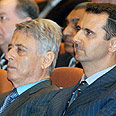
Khaddam: Arab MK mediated between Syria, Israel
MK Bishara replies to former Syrian vice-president by saying, 'These are nonsense comments; have no tie to reality. The timing is weird and raises amazement'
“Azmi Bishara mediated between Israel and Damascus. He was appointed by the Israeli intelligence and passed messages from Danny Yatom (former Mossad chief). Azmi Bishara, the ‘Arab nationalist’ passed messages and many in Syria complained that he passed information to Israel on the situation in Syria,” Khaddam told al-Sinnara newspaper on Thursday.
MK Bishara replied: “These are nonsense comments that have no tie to reality. The timing is weird and raises amazement.”
Khaddam said in the interview: “Azmi supervised. Now he is going to Lebanon and collecting information.”
When asked if he is accusing Azmi Bishara of being an Israeli agent, Khaddam said: “I did not say he is an agent. I said he is serving Israel. He is a Member of Knesset and serves Israel.”
The interview comes after French authorities banned him from giving interviews. But now he returned to speak to journalists, and among other things he spoke to the Nazareth-based al-Sinnara newspaper.
During part of the long interview Khaddam added a series of accusations against Syrian President Bashar Assad.
Khaddam spoke of negotiations between Israel and Syria during the terms of prime ministers Yitzhak Rabin and Ehud Barak.
“Rabin left a deposit with President (Bill) Clinton. I know of a handwritten letter that was delivered to President Hafez Assad from the United States that Rabin is ready to withdraw to beyond the borders of 4.6.1967; and of course we are speaking about peace and relations,” he said.
He also spoke of security arrangements: “The point of disagreement was the security arrangements. There were agreements on security principles, demilitarized regions on both sides of the border, international monitors at both sides and there was talk that it is not possible the security of one side comes at the cost of the other. But, when then Chief of Staff Ehud Barak met the Syrian chief of staff (Hekmat Shahabi) everything changed. Security arrangements according to Israel demanded a demilitarized region on the Syrian side, monitoring positions in Hermon, additional posts along the border, the dilution of Syrian troops south of Damascus and this in return for keeping Israeli forces in place.”
'Opposition front will be set up in Syria soon'
Khaddam said that president Assad’s decision to appoint his son to the presidency was a mistake: “The training of Bashar Assad to the presidency was one of the major mistakes of president Hafez Assad. Political considerations in Syria do not allow bequeathing of power positions within the state. He committed a big mistake and as such as the secretary general of the party and the head of prosecution he took steps to hand over the presidency to his son after his death.”
If so, what is the solution according to Khaddam: “I am estimate that change became a national necessity in Syria. Bashar Assad failed in managing the country and dealing with the economic situation. People’s situation has worsened a lot, unemployment rose and so have violations of human rights and corruption. The result is that Bashar Assad failed during the five and a half years in power and therefore it is natural he is expected to be replaced.”
Khaddam has been in contact with members of the Syrian opposition since he left Syria to France.
“The opposition front will be set up in Syria soon. At the moment a number of people and foreigners are consulting and we will get to building an opposition to manage the crisis in Syria,” he said.
Exiled Syrian opposition leaders including Khaddam and the head of the Muslim Brotherhood began meeting in Brussels on Thursday to form a united front aiming to topple Assad.
Meanwhile, Assad told British broadcaster Sky News that Syria is essential to securing peace in the region and cannot be ignored, even as he defended himself against charges of abetting terrorism and interfering in his neighbor's affairs.
"We are isolated in appearance only," Assad told Sky News, saying that Syria's role in the region was indispensable to the West's goals in the region. "If they want to talk about peace, then Syria is essential," he said. "If they want a stable Iraq, then Syria is essential."
The U.S. has frequently criticized Syria for its alleged failure to control the movement of terrorists across its border into Iraq. Earlier Thursday, a report released by the White House labeled the country a "tyranny."
Assad rejected the charges, saying that fighting Iraqi insurgents was in Syria's interests and that fully sealing its borders was impossible. "The Americans cannot control their borders with Mexico, so how can you expect Syria to close its border with Iraq?" he asked.
But he conceded that coordination with American forces across the border had ceased because such "cooperation has not achieved anything."
Assad said the only way forward in Iraq was for American forces to immediately leave, dismissing the argument that their removal from the country would deepen the sectarian strife there. "Iraq is on the brink of civil war, what could be worse?" he asked. He said that the insurgency was largely a political problem caused by U.S. Forces. "If they leave at least it could be better," he said.
Reuters contributed to this report










